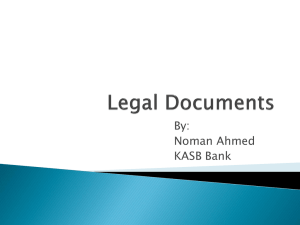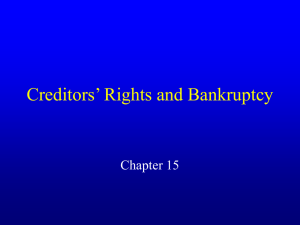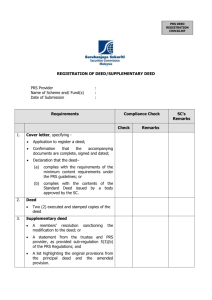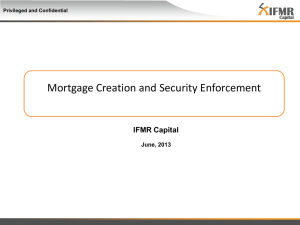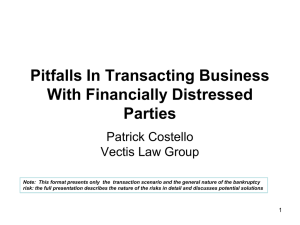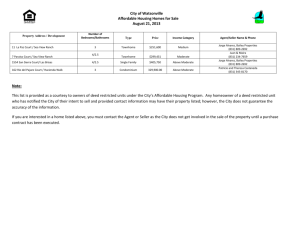Specific Security Deed relating to cash deposits required
advertisement
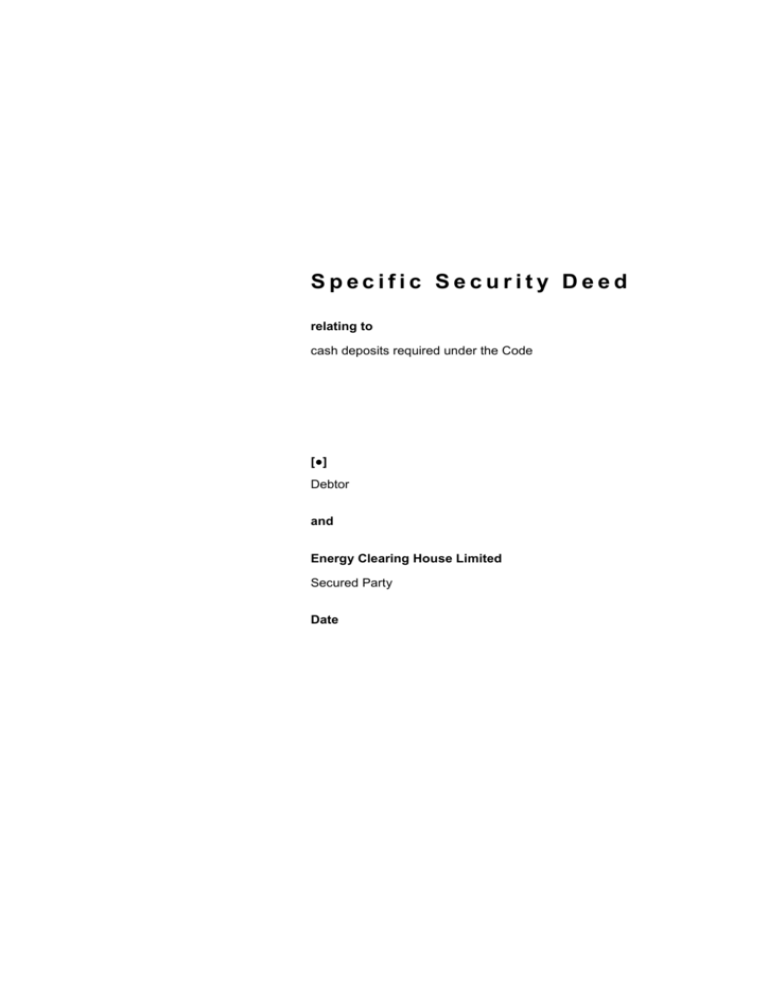
Specific Security Deed relating to cash deposits required under the Code [●] Debtor and Energy Clearing House Limited Secured Party Date Contents 1. Interpretation .............................................................................................................. 1 2. Covenant to pay .......................................................................................................... 3 3. Security ....................................................................................................................... 3 4. Representations.......................................................................................................... 4 5. Enforcement................................................................................................................ 4 6. Proceeds of enforcement ........................................................................................... 5 7. Assignment ................................................................................................................. 5 8. Notices ........................................................................................................................ 6 9. Costs ........................................................................................................................... 6 10. Remedies and waivers ............................................................................................... 6 11. Miscellaneous ............................................................................................................. 7 12. Governing law ............................................................................................................. 7 i This Specific Security Deed is made on between (1) [●] (Debtor) and (2) Energy Clearing House Limited (Secured Party) Introduction A. The Debtor is required to comply with the prudential requirements in the Code (as defined below). B. The Debtor may comply with the prudential requirements by paying a cash deposit. C. The Code requires each cash deposit to be held in approximately equal amounts between the two or more cash deposit accounts that the Secured Party is required to establish. D. To ensure compliance with the requirements of the Code in respect of providing and maintaining acceptable security in the form of a cash deposit, the Debtor has agreed to grant to the Secured Party security over the property described below, on the terms of this Deed. It is agreed 1. Interpretation 1.1 Definitions In this Deed, unless the context otherwise requires: Bank Accounts means each bank account established as a cash deposit account by the Secured Party under the Code, in the name of the Secured Party held with a Deposit Bank into which cash deposits from the Debtor to the Secured Party (or part of those cash deposits) will be made from time to time as required under the Code. The Debtor acknowledges that each Bank Account may contain cash deposits from more than one creditor of the Secured Party from time to time; Business Day means a day (other than a Saturday or Sunday) on which banks are generally open for business in Auckland and Wellington; Code means the Electricity Industry Participation Code 2010; Deposit means, at any time, an amount equal to: (a) the aggregate of the cash deposits made by the Debtor into the Bank Accounts as required under the Code, less: (b) the aggregate amount of any withdrawals made by the Secured Party from the Bank Accounts in respect of the Debtor under the Code or under this Deed, and, where used in the context of a single Bank Account means the Deposit with respect to that Bank Account only; 1 Deposit Bank means, at any time, a New Zealand registered bank used by the Secured Party at that time for the purpose of holding cash deposits from participants in accordance with the Code; Earnings means all money paid or otherwise credited to the Secured Party by the Deposit Banks during the currency of this Deed arising out of, or in connection with, the Deposit; Event of Default bears the meaning given to that term in the Code; PPSA means the Personal Property Securities Act 1999; Secured Indebtedness means all indebtedness of the Debtor to the Secured Party under the Code; and Secured Property means all present and future right, title and interest (legal and equitable) of the Debtor arising out of, or in connection with, the Deposit including, but not limited to, all proceeds of that property. 1.2 Construction of certain references In this Deed, unless the context otherwise requires: an agreement includes a contract, deed, licence, undertaking and other document or legally enforceable arrangement (in each case, whether or not in writing, present and future) and includes that document as amended, assigned, novated or substituted from time to time; costs incurred by a person include all commissions, charges, losses, expenses (including legal fees on a solicitor and own client basis) and taxes incurred by that person; indebtedness includes any obligation (whether present or future, actual or contingent, secured or unsecured, joint or several, as principal, surety or otherwise) relating to the payment of money; property includes the whole and any part of the relevant person's business, assets, undertaking, revenues and rights (in each case, present and future), and reference to any property includes any legal or equitable interest in it; a party to this Deed or another agreement includes its successors and its permitted assignees and transferees; and reference to a statute, regulation or rule includes reference to regulations, orders, directions or notices made under or pursuant to such statute, regulation or rule and all amendments to that statute, regulation or rule whether by subsequent statute, regulation, rule change or otherwise and a statute, regulation or rule passed in substitution for the statute, regulation or rule referred to or incorporating the relevant provisions. If the Secured Party considers that an amount paid by the Debtor under the Code is capable of being avoided or otherwise set aside on the liquidation of the Debtor or otherwise, then that amount shall not be considered to have been irrevocably paid for the purposes of the Code or this Deed. Headings and the table of contents are to be ignored in construing this Deed. 1.3 No postponement of attachment or subordination Nothing in this Deed is to be construed as: 2 2. (a) an agreement that a security interest under this Deed attaches at a later time than the time specified in section 40(1) of the PPSA; or (b) an agreement to subordinate a security interest under this Deed in favour of any person. Covenant to pay The Debtor will pay the Secured Indebtedness when due in accordance with the Code. 3. Security 3.1 Security To secure due payment of the Secured Indebtedness and performance of the Debtor’s obligations to the Secured Party under the Code, the Debtor grants to the Secured Party a security interest in the Secured Property. 3.2 Further assurance On the request of the Secured Party, the Debtor must, at its own cost, promptly execute and deliver to the Secured Party all documents, and do anything else that the Secured Party deems appropriate, or is otherwise required under the Code, to: 3.3 (a) obtain the priority required by the Secured Party; or (b) perfect a security interest intended to be created under this Deed; or (c) secure to the Secured Party the full benefit of its rights under this Deed; or (d) assign absolutely to the Secured Party any Secured Property. Release of security If the Debtor ceases to be a participant (as that term is defined in Part 1 of the Code) under the Code and, in the opinion of the Secured Party: (a) the Debtor has paid all the Secured Indebtedness; and (b) there is no reasonable possibility that any Secured Indebtedness received by the Secured Party will have to be repaid under any applicable law, the Secured Party will pay to the Debtor an amount equal to the Deposit. 3.4 Negative pledge The Debtor must not, without the Secured Party’s prior written consent, create, allow to be created or permit to exist, any security interest over any Secured Property (other than in favour of the Secured Party). 3 4. Representations 4.1 Representations relating to Secured Property The Debtor represents that: (a) Ability to create security it is entitled to create a security interest in, and to assign, the Secured Property to the Secured Party and has obtained all consents needed to enable it to do so; and (b) No security interests the security interest created by this deed is first ranking and no security interest exists over or affects, nor is there any agreement to give or permit to exist any security interest over or affecting, any Secured Property except as created or permitted by this Deed. 4.2 General representations The Debtor represents that: (a) Existence, power and authority it is incorporated, has full power and authority to enter into and comply with its obligations under this Deed and has taken all corporate and other action and obtained all consents needed to enable it to do so; and (b) Obligations enforceable its obligations under this Deed are legal, valid, binding and enforceable in accordance with their respective terms, subject to equitable principles and insolvency laws of general application. 4.3 Representations continuing Each of the representations in this clause 4 will be deemed to be repeated continuously so long as this Deed remains in effect by reference to the facts and circumstances then existing. 5. Enforcement 5.1 Rights of Secured Party following default If an Event of Default occurs: (a) the security interest created under this Deed will become immediately enforceable; and (b) in addition to, and without limiting, its rights under the Code, the Secured Party: (i) may, in the name of the Debtor or otherwise, at any time, do anything that the Debtor could do in relation to the Secured Property; 4 5.2 (ii) has all the rights of a natural person in relation to the Secured Property; and (iii) has all other rights conferred by law (including under Part 9 of the PPSA) in relation to the Secured Property. Waiver of rights The Debtor: (a) has no rights under, or by reference to, sections 114(1)(a), 133 and 134 of the PPSA; and (b) waives its rights to: (i) receive a statement of account under section 116 of the PPSA; (ii) receive notice of any proposal of the Secured Party to retain collateral under section 120(2) of the PPSA; and (iii) object to any proposal of the Secured Party to retain collateral under section 121 of the PPSA. 6. Proceeds of enforcement 6.1 Proceeds of enforcement To the extent permitted by law, all money arising from or in connection with the exercise of the enforcement rights of the Secured Party is to be applied in accordance with the Code. 6.2 Contingent amounts If, at the time of distribution of any money under clause 6.1, any part of the Secured Indebtedness is contingently owing to the Secured Party, the Secured Party may retain an amount equal to all or part of that contingent indebtedness. 7. Assignment 7.1 Benefit and burden of this Deed This Deed is binding upon and enures for the benefit of the parties and their respective successors and permitted assignees or transferees. 7.2 The Secured Party The Secured Party may assign or transfer any of its rights or obligations under this Deed without the consent of the Debtor. Each assignee or transferee is to have the same rights against the Debtor under this Deed as if named in this Deed as the Secured Party. 7.3 The Debtor The Debtor may not assign or transfer any of its rights or obligations under this Deed without the prior written consent of the Secured Party. 5 8. Notices 8.1 Addresses and references Each notice or other communication under this Deed is to be made in writing and sent by facsimile, personal delivery or by post to the addressee at the facsimile number or address, and marked for the attention of the person or office holder (if any), from time to time designated for the purpose by the addressee to the other party, or otherwise determined in accordance with the Code. 8.2 Deemed delivery No communication will be effective until received. A communication to the Debtor is, however, deemed to be received: 9. (a) in the case of a letter, on the third Business Day after posting; and (b) in the case of a facsimile, on the Business Day on which it is despatched or, if despatched after 5.00 p.m. (in the place of receipt) on a Business Day or on a nonBusiness Day, on the next Business Day after the date of despatch. Costs The Debtor will pay each cost incurred by the Secured Party in connection with the exercise, protection or enforcement of the Secured Party's rights under this Deed, in each case, on demand and on a full indemnity basis. 10. Remedies and waivers 10.1 Exercise of rights and waivers Time is of the essence in respect of all dates and times for compliance by the Debtor with its obligations under this Deed. However, no failure to exercise, and no delay in exercising, a right of the Secured Party under this Deed will operate as a waiver of that right, nor will a single or partial exercise of a right preclude another or further exercise of that right or the exercise of another right. No waiver by the Secured Party of its rights under this Deed is effective unless it is in writing signed by the Secured Party. 10.2 Verification statement The Debtor waives its right under section 148 of the PPSA to receive a copy of a verification statement in respect of any financing statement or financing change statement registered by the Secured Party in respect of any Secured Property. 10.3 Remedies cumulative The rights of the Secured Party under this Deed are cumulative and not exclusive of any rights provided by the Code or by law. 6 11. Miscellaneous 11.1 Amendments No amendment to this Deed is effective unless it is in writing signed by all the parties. 11.2 Partial invalidity The illegality, invalidity or unenforceability of a provision of this Deed under any law will not affect the legality, validity or enforceability of that provision under another law or the legality, validity or enforceability of another provision. 11.3 Counterparts This Deed may be signed in any number of counterparts (including facsimile or PDF counterparts) all of which, when taken together, will constitute one and the same instrument. A party may enter into this Deed by executing any counterpart. 11.4 Enforcement by the Secured Party For the purposes of the Contracts (Privity) Act 1982, the Debtor acknowledges and accepts that its obligations under this Deed shall be enforceable by the Secured Party notwithstanding the Secured Party may not sign this Deed. 12. Governing law This Deed is governed by and is to be construed in accordance with New Zealand law. Execution Executed and delivered as a deed Debtor [ ] by: Director Director Print Name Print Name 7 Secured Party SIGNED on behalf of Energy Clearing House Limited by: ___________________________________ Authorised Signatory In the presence of: ___________________________________ Name: Occupation: Address: 8


